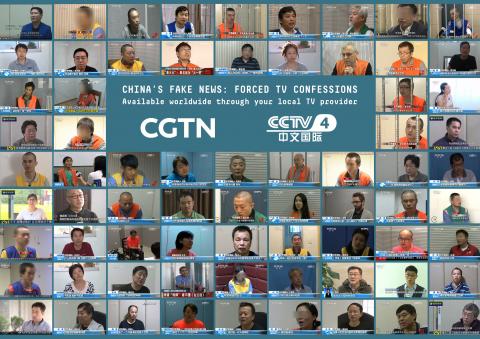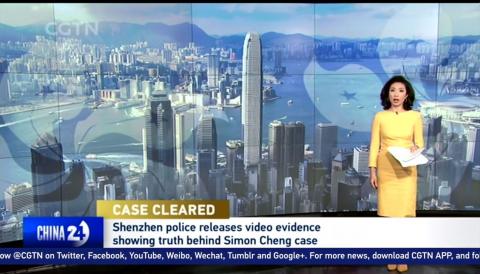Analysis of Ofcom’s penalties against Chinese TV CGTN
On August 26, Ofcom, the UK’s TV regulator, announced further penalties against Chinese State/Party TV CGTN, which was reported on by Safeguard Defenders (SD). This analysis seeks to clarify how Ofcom arrived at those penalties, for what CGTN was found in violation of, and how well these penalties match the expectations from SD and how it matches existing penalty guidelines.
As already established by Ofcom in its Final Adjudications earlier, it found CGTN guilty of violating the UK broadcasting code rule 7.1 and 8.1 for both broadcasts of Gui Minhai, and the broadcast of Simon Cheng.
Those rules specifically state:
- Rule 7.1: “Broadcasters must avoid unjust or unfair treatment of individuals or organisations in programmes” and.
- Rule 8.1: “Any infringement of privacy in programmes, or in connection with obtaining material included in programmes, must be warranted”.
The central consideration for Ofcom in the sanctions decisions were to consider if the violations were also serious/severe, deliberate, repeated, or reckless – each four type which would, in Ofcom’s mind, make the violation worse, and which would have an impact on the penalty issued. That these were serious/severe violations had already been established.
- Full decision on Gui Minhai broadcasts available here.
- Full decision on Simon Cheng broadcasts available here.
With that in mind, Ofcom noted that the Gui Minhai broadcasts followed other similar broadcasts, and for which they had been convicted of, namely two broadcasts of a similar type with British citizen Peter Humphrey. It did note however that, at the time of Ofcom’s decision concerning these, the broadcasts related to Gui Minhai had already been aired.
They note: “there were similarities between these programmes and the China 24 (2013) and News Hour (2014) programmes for the same violations” (7.1 and 8.1) for Peter Humphrey.
As with their prior decision regarding the two Peter Humphrey broadcasts, Ofcom held “that SCML (CGTN’s license holder) had failed to obtain informed consent from the complainants” and ”SCML presented the purported confession as being genuine and voluntary when SCML had reason to doubt this”.
Ofcom also states, in both cases (Gui Minhai and Simon Cheng) that these “represented a serious and repeated failure of compliance”.
By the time of the broadcast of Simon Cheng’s confession, the licensee had already been found in severe violation for airing similar content (Peter Humphrey), and had – in communication with Ofcom - made promises to institute protections against this reoccurring, which, with his broadcast, made those promises empty and untrustworthy, and became a strong point against CGTN.
The licensee had, in communication with Ofcom, “taken careful note of Ofcom’s views on broadcasting pre-trial confessions and that it did not intend to broadcast such material in the UK other than in exceptional circumstances”.
Ofcom further states that the “central objective of imposing a penalty is deterrence” and that doing so was of added important due to the fact that the “degree of harm caused to the complainant was very serious”. That CGTN had, by the time of the Simon Cheng broadcast violated its own promises to Ofcom, further undermined CGTN’s claim to have learned its lesson.
Ofcom elaborated on this, stating:
“In particular, the Licensee told Ofcom that their enhanced processes included referring all pre-trial confession footage that it may consider broadcasting for further scrutiny by the geographical Head of the production centre, who could then refer the matter to the channel’s Global Editorial Board, or for external specialist advice, as well as delivering specific training in this area.”
“Despite putting these measures in place, the Licensee’s amended compliance procedures were unable to prevent similar breaches from occurring in this case, and in respect of the broadcast of a programme on 21 November 2019, which Ofcom also found to be in breach of Rules 7.1 and 8.1 of the Code in very similar circumstances.”
Related to Gui’s broadcasts, especially the later one, Ofcom states that “the broadcaster was either aware or ought to have been aware, as argued by Ms Gui in her representations on Ofcom’s Breach Preliminary View, that the circumstances of Mr Gui’s return to China were disputed, but nevertheless the programmes had stated that he had returned to China voluntarily without making clear that the circumstances of his return were disputed”.

This led Ofcom to declare that this was “evidence of seriously inadequate compliance processes”, and that “There is no evidence that SCML has taken any action to remedy the adverse consequences for Mr Gui resulting from their contraventions”.
There is therefore strong evidence that, beyond being serious/severe violations, they are also repeat offences, and in addition, that CGTN, despite written assurances, has continue its practice. Ofcom state:
“Further, while the publication of Ofcom’s Adjudications on these complaints post-dated the broadcast of this programme, at the time of the broadcast of the programme on 21 November 2019, the licensee was aware that Ofcom had launched an investigation into these other programmes which contained a number of similarities, as described above. In view of these similarities, Ofcom therefore considered that the breach of Rules 7.1 and 8.1 of the Code in this case were repeated.”
Ofcom did not consider there was “evidence to conclude that these amounted to recklessness as to whether a contravention was occurring or would occur”.
In the case of the broadcast related to Simon Cheng, CGTN also aired easily disproven lies, stating:
“Ofcom found that the programme’s reference to video footage being released by the police of Mr Cheng’s “trial [i]n August” clearly implied that Mr Cheng had been convicted of the alleged offences referred to in the programme following a criminal trial.” CGTN’s excuse, that this was simply a mistake, did not change Ofcom’s view.
The licensee countered that since the penalties are for deterrence, and because they had already lost their license, that no fines should be imposed, as it could not deter them, as they no longer held a license. The decision reads:
“SCML noted that Ofcom had said in its Sanction Preliminary View that the central objective of imposing a penalty is deterrence. SCML said that Ofcom acknowledged in the Sanction Preliminary View that SCML itself presented no risk of non-compliance since it no longer held an Ofcom broadcasting licence”.
“Even where a broadcaster no longer holds a licence, it may be appropriate and proportionate to impose a statutory sanction where the former licensee has committed a breach during the period when it held a licence which is serious, deliberate, reckless or repeated, in order to provide an appropriate deterrent to wider industry against non-compliance. Otherwise, serious breaches could go unpunished, which could ultimately weaken incentives for compliance by wider industry, and therefore trust in the regulatory regime”.
Ofcom also decided that the broadcast violations were not deliberate, stating, “Ofcom found that that there was no evidence that the breaches were deliberate or reckless”.
A fine of 100,000 British pounds was decided upon for both cases. This is less than that issued, twice, against Abu Dhabi Media Company for similar broadcasts (125,000 Pounds) but in those cases, they had also been found to have acted recklessly. It also considered the budget of the licensee and decided that 100,000 Pounds was an appropriate amount (the maximum amount allowed is 250,000 Pounds).

SD take on this is that this is a strong deterrent to other broadcasters, as well as to CGTN, which is hoping and working on getting back onto the air in the UK, and also notes that since Ofcom first launched the initial official investigation regarding Peter Humphrey-centered broadcast violations, CGTN has significantly reduced, almost eliminated, forced televised confessions, in its broadcasts, but that CCTV-4 (the Chinese language international channel) and domestic CCTV channels continue to employ them regularly. This is strengthened by information from a whistle-blower that the initial complaint by Peter Humphrey caused CGTN/CCTV to hold an all-weekend emergency meeting at the Beijing headquarter.
This proves SD’s original analysis, that if regulatory action is taken and CGTN starts to risk losing its right to air, it will choose to reduce these broadcasts rather than risk losing access. General propaganda is deemed more important than occasional but regular forced televised confessions, and the former requires licensing.
SD does, however, take opposition to Ofcom’s failure to properly assign a rising amount of fines per each broadcast violation. These are now the second and third case of forced televised confession cases being judged as serious offences, and represents the third, fourth and fifth such broadcasts (see below). By Ofcom’s own code, which says that “repeated contraventions may lead to significantly increased penalties”, Ofcom has failed to implement this rule.
The fine for the case of Peter Humphrey (two broadcasts) was 100,000 Pounds, equal to that of Gui Minhai (also two broadcasts) and Simon Cheng (one broadcast). The subsequent fines should have been increased due to:
- Due to this being a repeat behaviour, each case should result in a higher fine than the preceding one, rather than remain the same for all three penalties.
- For each new convicted offence, the repeat offender aspect becomes stronger and should lead to an increase in fines.
- Concerning the Simon Cheng broadcast, CGTN had already been found guilty for these types of broadcasts and had made promises to Ofcom, which it then subsequently ignored entirely, leaving no choice but to assume these internal changes and protections are either dysfunctional, intentionally ignored, or intentional lies to trick Ofcom related to Ofcom's earlier decisions.
- The latter broadcast (Simon Cheng) should also call into question whether or not Ofcom was right to conclude that the violation was not deliberate, as at this time CGTN’s senior management was well aware that these would constitute a violation, but decided to air it anyway.
Finally, the repeat offences CGTN has now been found guilty of, the overwhelming evidence presented to Ofcom of nearly 100 such broadcasts (but where victims have not been able to file such, or broadcasts were done via CCTV-4, not CGTN, which is not regulated by Ofcom), alongside several other broadcast violation (biased reporting on Hong Kong protests for example), alongside a failure to inform Ofcom of changes to its ownership and/or control, which is likewise a violation, all points towards CGTN being not “fit and proper” as a broadcaster, and Ofcom has both the power and obligation to examine whether any broadcaster with a license is “fit and proper”.
One more complaint, already accepted by Ofcom, against CGTN, remains in process, with a preliminary view (decision) forthcoming, and if held guilty, CGTN may face additional sanctions. The complaint is related to defamation broadcast of the earlier forced televised confession victim Peter Humphrey, concerning the programme The Point, aired December 29, 2019.
For more information on the various complaints filed against CGTN or CCTV see this timeline resource.